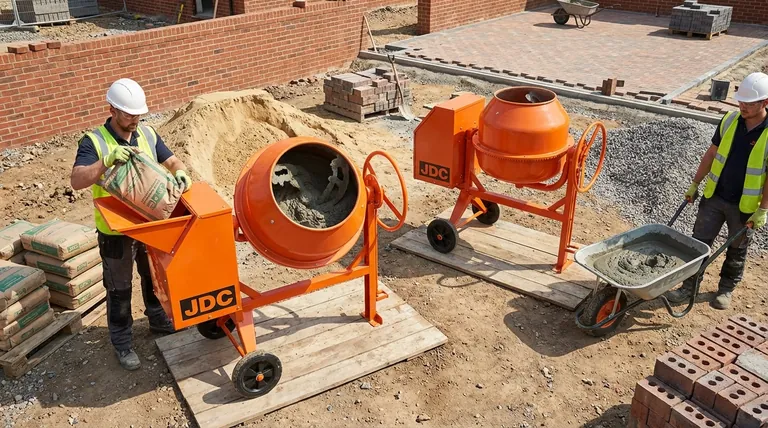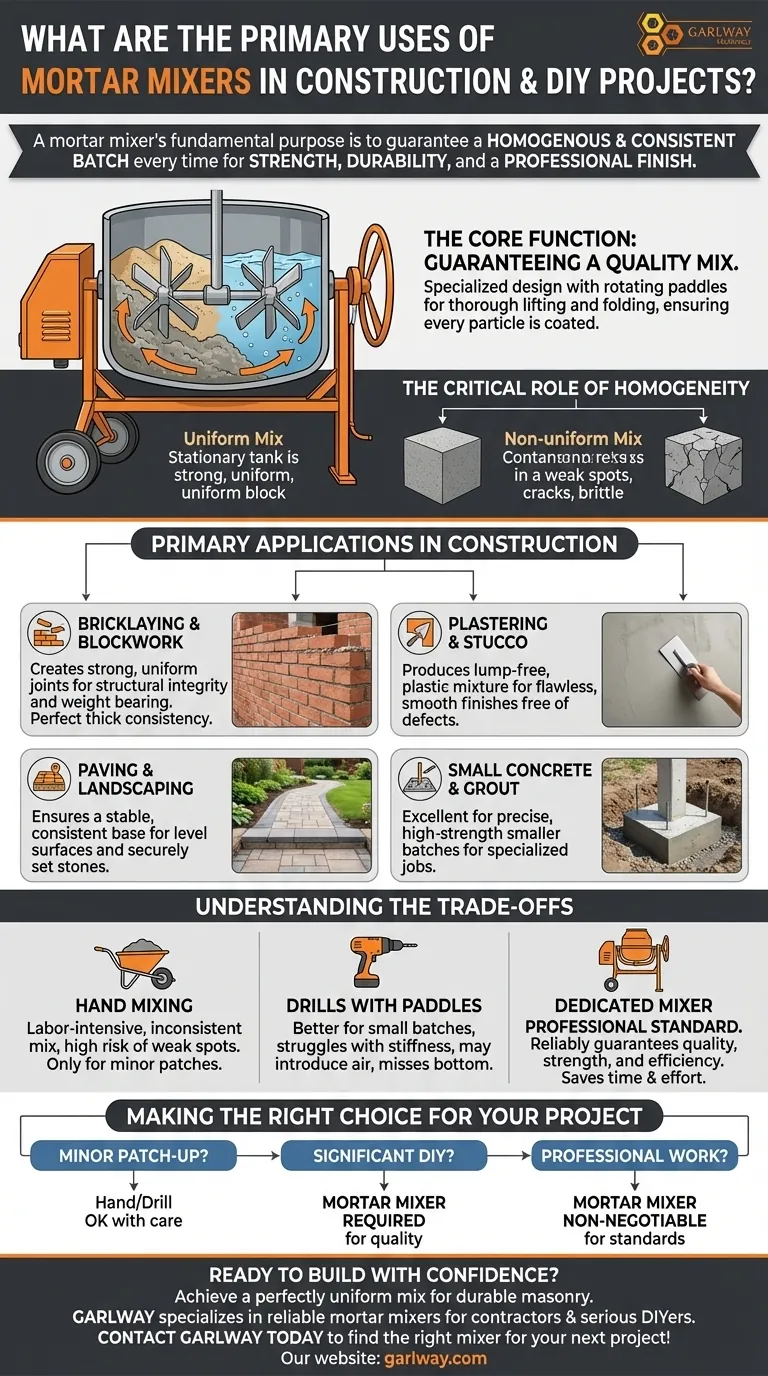In professional construction and serious DIY, a mortar mixer is the dedicated tool for combining cement, sand, aggregates like gravel, and water. Its primary uses are to create perfectly uniform mixtures for bricklaying, plastering, paving, landscaping, and producing smaller batches of concrete or grout.
A mortar mixer’s fundamental purpose is not just to stir ingredients, but to guarantee a homogenous and consistent batch every time. This consistency is the critical factor that determines the strength, durability, and professional finish of any masonry work.

The Core Function: Guaranteeing a Quality Mix
The effectiveness of a mortar mixer lies in its specialized design, which is engineered for one specific outcome: a flawless, workable blend of materials.
How a Mortar Mixer Works
Modern mortar mixers use a stationary tank equipped with rotating paddles or blades, often in a star shape. These blades move through the material, lifting and folding it repeatedly to ensure every particle of sand and cement is properly coated with water. This mechanical action is far more thorough than any manual method.
The Critical Role of Homogeneity
A non-uniform mix is the root cause of project failure. Pockets of dry sand create weak spots, while areas with too much cement can become brittle and crack. A mortar mixer eliminates this risk by delivering a consistent, homogenous product, ensuring predictable strength and adhesion across the entire project.
Primary Applications in Construction
A mortar mixer is not a general-purpose tool; it is a specialist machine used where the quality of the mix directly impacts structural integrity and aesthetics.
Bricklaying and Blockwork
For laying bricks, blocks, or stone, mortar acts as the adhesive binder. The mixer ensures that every batch has the ideal thick consistency and adhesive properties, creating strong, uniform joints that will bear weight and resist the elements.
Plastering and Stucco
When applying plaster or stucco, the finish must be smooth and free of defects. A mortar mixer produces a lump-free, plastic mixture that is easy to trowel onto a wall, resulting in a flawless surface without imperfections caused by poorly mixed material.
Paving and Landscaping
Creating a bed for pavers, flagstones, or garden walls requires a stable, consistent mortar base. The mixer provides this foundation, ensuring that the finished surface is level and that each stone is securely set in place.
Concrete and Grout
While larger jobs require a dedicated cement (or "barrel") mixer, a mortar mixer is excellent for creating smaller batches of concrete or specialized grout. Its design is particularly effective for mixes that require the fine blending of materials to achieve high precision and strength.
Understanding the Trade-offs
Choosing not to use a mortar mixer has direct consequences on the quality, efficiency, and longevity of your work.
Hand Mixing
Mixing mortar in a wheelbarrow with a hoe is suitable only for the smallest patch repairs. It is incredibly labor-intensive and makes achieving a truly consistent mix nearly impossible, introducing a high risk of weak spots in the final product.
Drills with Paddle Attachments
Using a power drill with a paddle is a step up from hand mixing for very small batches. However, it can struggle with stiffer mixes, fail to combine materials at the bottom of the bucket, and potentially introduce too much air, weakening the mortar.
The Case for a Dedicated Mixer
For any project beyond a minor repair, a dedicated mortar mixer is the professional standard. It is the only method that reliably guarantees the mix quality required for work that is both structurally sound and aesthetically pleasing. The efficiency gained also saves significant time and physical effort.
Making the Right Choice for Your Project
Selecting the correct mixing method is the first critical decision that will define your project's outcome.
- If your primary focus is a minor patch-up (e.g., re-setting a single paver): Hand mixing or a drill attachment can be sufficient if done with extreme care.
- If your primary focus is a significant DIY project (e.g., building a garden wall or plastering a room): A mortar mixer is the correct tool to ensure a uniform, high-quality result without risking structural failure.
- If your primary focus is professional construction work: A mortar mixer is non-negotiable for maintaining standards of quality, safety, and efficiency.
Ultimately, investing in the right mixing process is the foundation for building something with confidence and durability.
Summary Table:
| Primary Use | Key Benefit |
|---|---|
| Bricklaying & Blockwork | Creates strong, uniform joints for structural integrity. |
| Plastering & Stucco | Produces lump-free, smooth finishes for flawless walls. |
| Paving & Landscaping | Ensures a stable, level base for pavers and garden walls. |
| Small Concrete/ Grout | Ideal for precise, high-strength small batches. |
Ready to build with confidence?
Achieving a perfectly uniform mix is the foundation of any durable masonry project. Don't let inconsistent hand-mixing compromise your work's strength and finish.
GARLWAY specializes in robust construction machinery, offering reliable mortar mixers designed for contractors and serious DIYers who demand professional results.
Let us help you ensure every batch is perfect. Contact GARLWAY today to find the right mixer for your next project!
Visual Guide

Related Products
- JDC350 Small Cement Concrete Mortar Mixer
- Auto Concrete Cement Mixer Machine New
- Commercial Construction Mixer Machine for Soil Cement Mixing Concrete
- Construction Products Concrete Plant Machine Mixing Concrete Mixer
- Commercial Electric Concrete Mixer Machine HZS 50 Small Batch Plant for Sale
People Also Ask
- Why do volumetric mixers provide better ROI? Maximize Profit with On-Demand Concrete Production
- What are the main advantages of a self-loading concrete mixer? Boost On-Site Efficiency & Cut Costs
- What are the three main categories of industrial mixers? Choose the Right Mixing Mechanism for Your Materials
- What practical benefits have users reported about self-loading mixers? Streamline Your Concrete Operations
- What are Pan Mixers ideal for? Achieving Superior Homogeneity in Concrete & Mortar Mixing
- What is the key functional difference between self-loading mobile concrete mixers and regular mixer trucks?
- What are the key features of a mortar mixer? Mastering Thick, Sticky Materials with High-Shear Mixing
- How do self-loading mixers reduce labor costs? Slash Your Crew Size from 3 to 1



















